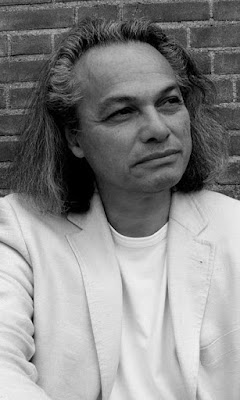Yesterday Alfred Birney was announced as the winner of the most prestigious literary prize in the Netherlands: AKO Literature Award. It was for his book Tolk van Java (Translator of Java). The book is about his father Adolf Nolan, born in 1935 in Surabaya from a truly colonial mixed family: father half Scottish/Dutch, mother Chinese/Javanese. He was a cruel fighter against Japanese in the period 1943-5 and then vowed to defend the Dutch Queen and administration (kneeling before an image of Queen Wilhelmina, in fact a vague unknown personage to him) in the period 1945-1949. Then he came as a broken personality to the Netherlands where he had a poor career in many jobs, dying at the age of 80 in 2005, in self-chosen exile in Spain.
His son Alfred Birney was born in 1952, experienced the impossible marriage of his cruel father to a weak Dutch lady, was partly educated in an orphanage, never had a good home for himself nor for his brothers and sisters, but developed first as a musician (playing guitar in the kroncong style of entertainment) and then becoming a writer. He published in 1998 a colonial literary history, Oost-Indische Inkt, but now his masterpiece, which was compared to the other great criticism of colonialism, Max Havelaar.
Max Havelaar (first published in 1860) is a severe criticism of colonialism, but besides many feudal Indonesians and lazy and corrupt Dutch officials, the hero of the book is the enlightened Dutch official/administrator who knows the ideal solution for the situation.
Tolk van Java is so different: it has only the dark side of the tropical paradise. Not the lyric, the romantic glorification of the tropical country, but the brutality of a divided country where racial prejudices and boundaries are strong, where violence continues and the value of an individual outside the privileged classes means very little. Adolf Nolan driven by some irrational sympathy for the Dutch Queen joins the Dutch army after its return to Surabaya in late 1945 and becomes an interrogator of Indonesian Nationalist soldiers and activists. The book is full with brutal killings, torture, also onthe Indonesian side. No romantic of a heroic war of independence. Finally there was much frustration on the Dutch side, but also many leaders on the Indonesian side who sought profit for their own sake.
There is a renewed interest for the dark side of the period 1945-1949 with more money for research, the publication of the great book by Rémy Limpach about the 'burning villages of General Spoor' (De brandende kampongs van Generaal Spoor) 870 pages.



Geen opmerkingen:
Een reactie posten